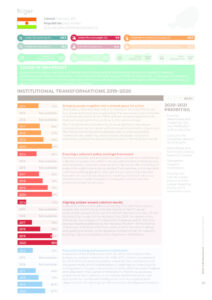Nutrition situation
Under five stunting (%)
48.5
Under five overweight (%)
1
Anaemia in women 15-49 years (%)
49.5
Under five wasting (%)
14.1
Low birth weight (%)
n.a.
0 to 5-month-old exclusive breastfeeding (%)
23.3
Adolescent overweight (%)
Male: 4.7
/ Female: 10.9
Adult overweight (%)
Male: 14.6
/ Female: 30
Adult obesity (%)
Male: 2.5
/ Female: 8.7
Adult diabetes (%)
Male: 5.9
/ Female: 5.3
COVID-19 snapshot
Government actors at the inter-ministerial technical level and at the local level have participated in national coordination structures and systems in the context of the fight against COVID-19. Despite the challenges, the networks have kept their commitments through teleconference meetings. Activities, including the SMART study, are starting up again, in spite of some postponements and delays.
Institutional transformations 2019-2020
Bringing people together into a shared space for action
The bodies of the National Policy for Nutrition Security (PNSN) are functional and actors are cooperating. The various sectoral ministries at all levels are aware of the PNSN and are integrating nutrition in their various programmes as far as to the devolved level.The SUN platforms and other multi-actor platforms have been revitalised and are functional with increased mobilisation of partners. The PNSN monitoring and evaluation plan and accountability framework are under way and a process has been initiated to nominate a political focal point and to create a technical secretariat.
Ensuring a coherent policy and legal framework
Numerous studies and analyses have been carried out. Furthermore, a decree on biosecurity, which includes components of food security and food safety, has been adopted and a decree on the marketing of breastmilk substitutes is being drafted. Furthermore, a multisectoral technical working group for strengthening maternity protection has been set up and has adopted a roadmap. Nutrition advocacy seminars have made it possible to integrate nutrition into the parliamentarians’ action plan.Aligning actions around common results
Evaluation of the action plan is underway. The data from various studies (the SMART study 2019, the results of the IPC acute malnutrition analysis from the end of 2019, the results of the „Fill the Nutrient Gap“ study, Fill the Nutrient Gap, 2018, the results of the SAN study, the analyses of malnutrition trends as well as the other analysis reports published by the National Platform for Nutritional Information (PNIN) in 2020) have been used for decision-making and guiding activities. In the absence of a formal plan for capacitybuilding, capacity-building actions have been established.Financial tracking and resource mobilisation
Evaluation of the PNSN action plan, as well as the results of the budgetary analysis carried out for 2016–2017 and the one planned for 2018–2019, will make it possible to identify the contributions of the government and of stakeholders. A roadmap for financing the management of acute malnutrition for 2020–2029 has been finalised and adopted in the Council of Ministers. Furthermore, advocacy actions have been carried out to mobilise parliamentarians and authorities for nutritional funding as far as to the regional level. Opportunities are opening up with innovative funding mechanisms.2020-2021 Priorities
- Develop, disseminate and implement the new PNSN 2021– 2025 Action Plan.
- Carry out the budgetary analysis for 2018–2019.
- Institutional and functional capacitybuilding of actors.
- Strengthen resource mobilisation.
- Develop the human capital project and the Global Financing Facility (GFF) investment case.
Download

